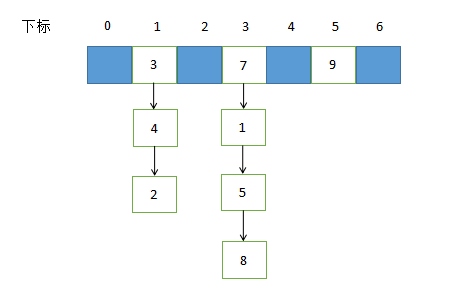问题描述
给出一个数组和一个数字k,要求找出数组中数字出现频率最高的k个数字。如果按照出现频率从高到低取数字时,发现在某个频率有 m 个相同的数字,在该频率前面共有 n 个数字,且 n + m > k,则从m个数字中任意取 k - n个数字,这 k - n个数字无顺序要求,也无特定数字要求。
此题要求时间复杂度小于O(nlog n),其中 n 是数组的长度
样例输入输出
输入:nums = [][1,1,1,2,2,3] [1,1,1,2,2,3] , k = 2
输出:[1,2]
输入:nums = [1,1,1,3,3,3,2,2,2] , k = 2
输出:[1,2]或者[1,3]或者[2,3]。不能输出[1,2,3]
问题解法
此解法主要参考**https://leetcode.com/problems/top-k-frequent-elements/discuss/81635/3-Java-Solution-using-Array-MaxHeap-TreeMap**
主要过程如下
- 先遍历数组,找出每个数字出现的次数,存放在map中
- 遍历map,用一个List数组来存放map中的数组,其中数组的下标是map的value值,表示数字出现的次数,数组下标对应的元素是一个List列表,存放数组中数字出现次数是这个下标值的数字。假设输入数组是[3,4,2,7,7,7,1,1,1,5,5,5,8,8,8,9,9,9,9,9],则构造的数组如下图所示,数组下标5的位置存放数字9,说明9出现的次数是5次,数组下标位置3存放的数字列表是[7,1,5,8],说明数字7、1、5、8出现的次数是3,数组下标位置1存放的数字列表是[3,4,2],说明数字3、4、2出现的次数是1,数组下标位置4、6没有存放数字,说明没有数字出现的次数是4次或6次。

- 对第二步骤构造的数组,从后向前遍历,依次取出k个数字作为结果返回。例如以上图为例,假设k = 2,则返回[9,7](数字9出现5次,数字7出现3此,当然也可以返回[9,1]或其他等价的结果),假设k = 1,则返回[9],假设k = 5,则返回[9,7,1,5,8](当然,也可以返回[9,7,5,1,8]或其他等价的结果)
整个过程时间复杂度为O(n),低于题目的要求O(nlog n)
代码如下
1
2
3
4
5
6
7
8
9
10
11
12
13
14
15
16
17
18
19
20
21
22
23
24
25
26
27
28
29
30
31
32
33
34
35
36
37
38
39
40
41
42
43
44
45
46
47
48
49
50
51
52
53
54
55
56
57
58
59
60
61
62
63
64
65
66
67
68
69
70
| import java.util.Map.Entry;
class Solution
{
public List<Integer> topKFrequent(int[] nums, int k)
{
Map<Integer, Integer> numsMap = new HashMap<>();
for (int i = 0; i < nums.length; i++)
{
int numCount = numsMap.getOrDefault(nums[i], 0) + 1;
numsMap.put(nums[i], numCount);
}
List<Integer>[] numCountsBucket = new List[nums.length + 1];
for (Entry<Integer, Integer> entry : numsMap.entrySet())
{
int num = entry.getKey();
int count = entry.getValue();
List<Integer> numList = numCountsBucket[count];
if (numList == null)
{
numList = new ArrayList<>();
numList.add(num);
numCountsBucket[count] = numList;
}
else
{
numList.add(num);
}
}
List<Integer> result = new ArrayList<>();
for (int i = numCountsBucket.length - 1; i >= 0; i--)
{
List<Integer> numList = numCountsBucket[i];
if (numList != null)
{
result.addAll(numList);
k -= numList.size();
}
if (k == 0)
{
break;
}
else if (k < 0)
{
while (k < 0)
{
result.remove(result.size() - 1);
k++;
}
break;
}
}
return result;
}
}
|
参考资料
https://leetcode.com/problems/top-k-frequent-elements/discuss/81635/3-Java-Solution-using-Array-MaxHeap-TreeMap
